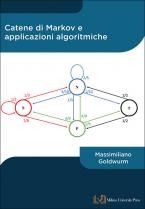Catene di Markov e applicazioni algoritmiche
Synopsis
Markov chains represent a classical topic of probability theory that has a large number of applications in different areas, including mathematics, computer science, physics, biology, natural science, economics and several others. Typical examples of Markovian models concern for instance the analysis and interpretation of DNA sequences, voice recognition and the design of procedures for analysis and browsing of the web. In computer science and in particular in the algorithmic area Markov chains have been used to introduce the so-called Markov Chain Monte Carlo methods, which allow us to design probabilistic approximation algorithms for solving NP-hard problems. This work presents Markov chains and their algorithmic applications in a mathematical style, with a didactic spirit. It mainly has educational purposes, and it is specifically designed for teaching these topics in Italian university courses at a master level.


